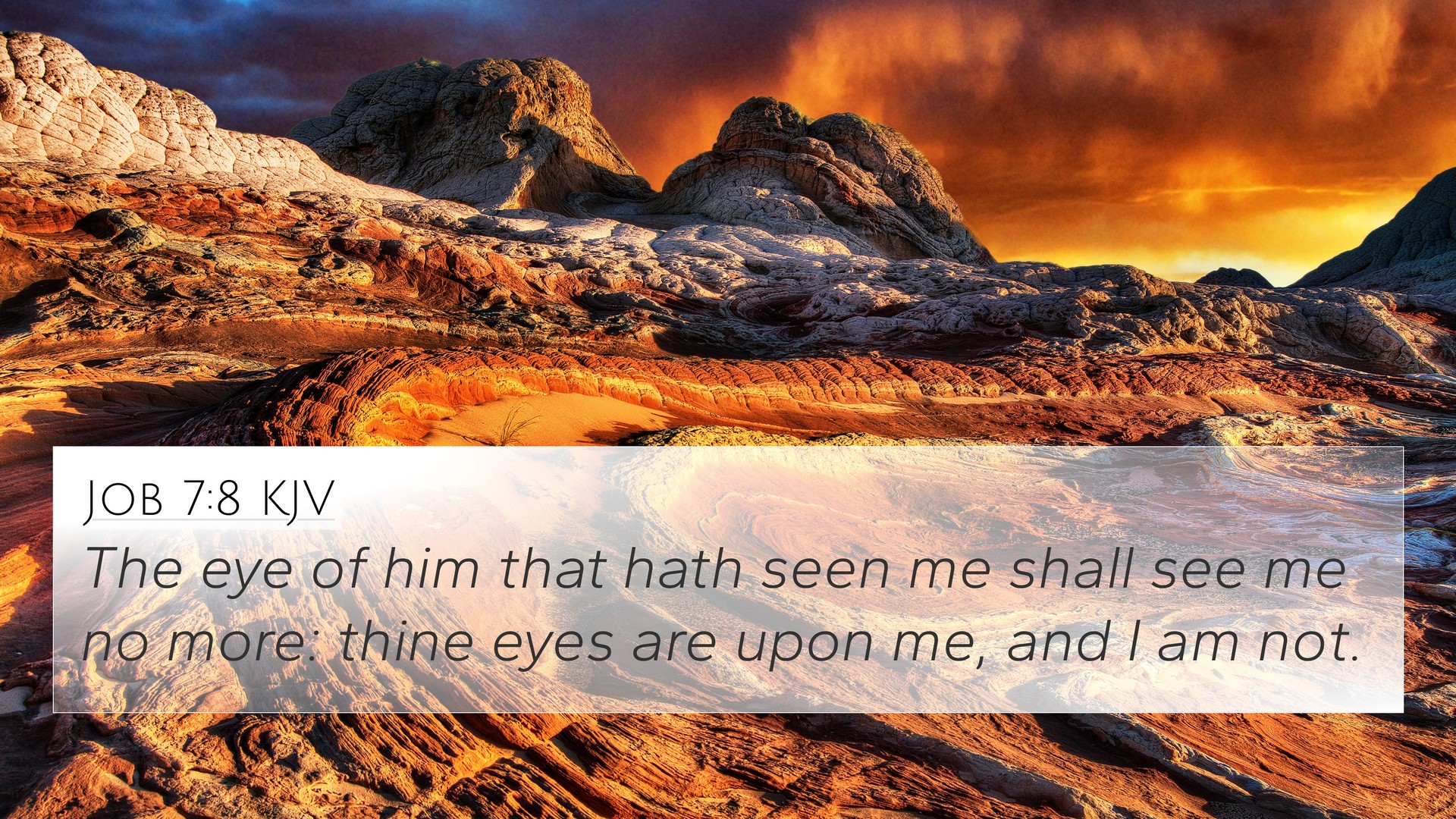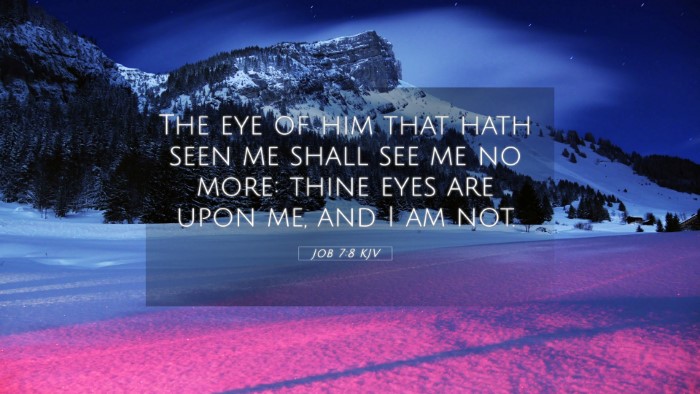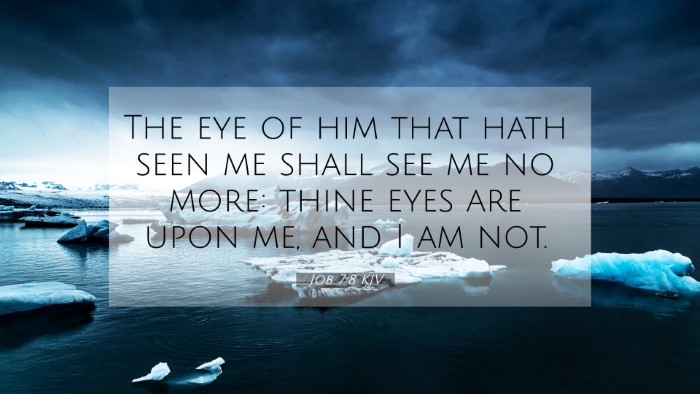Old Testament
Genesis Exodus Leviticus Numbers Deuteronomy Joshua Judges Ruth 1 Samuel 2 Samuel 1 Kings 2 Kings 1 Chronicles 2 Chronicles Ezra Nehemiah Esther Job Psalms Proverbs Ecclesiastes Song of Solomon Isaiah Jeremiah Lamentations Ezekiel Daniel Hosea Joel Amos Obadiah Jonah Micah Nahum Habakkuk Zephaniah Haggai Zechariah MalachiJob 7:8 Similar Verses
Job 7:8 Cross References
The eye of him that hath seen me shall see me no more: thine eyes are upon me, and I am not.
Uncover the Rich Themes and Topics of This Bible Verse
Listed below are the Bible themes associated with Job 7:8. We invite you to explore each theme to gain deeper insights into the Scriptures.
Job 7:8 Cross Reference Verses
This section features a detailed cross-reference designed to enrich your understanding of the Scriptures. Below, you will find carefully selected verses that echo the themes and teachings related to Job 7:8 KJV. Click on any image to explore detailed analyses of related Bible verses and uncover deeper theological insights.
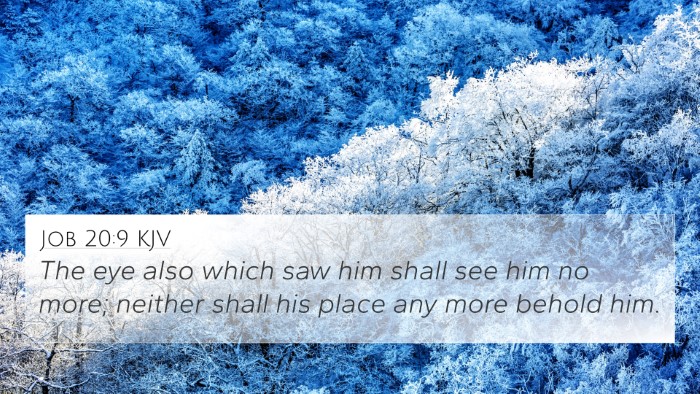
Job 20:9 (KJV) »
The eye also which saw him shall see him no more; neither shall his place any more behold him.
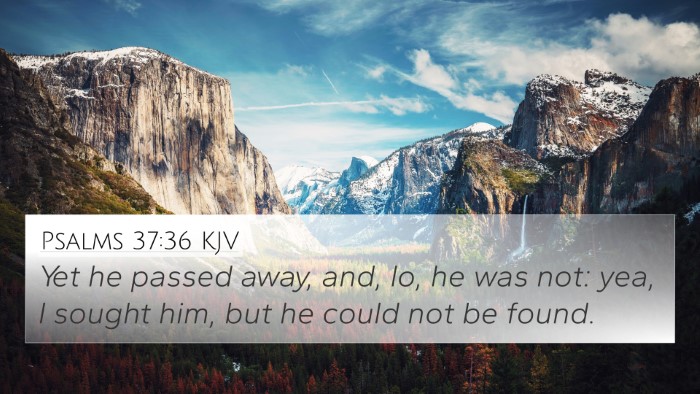
Psalms 37:36 (KJV) »
Yet he passed away, and, lo, he was not: yea, I sought him, but he could not be found.
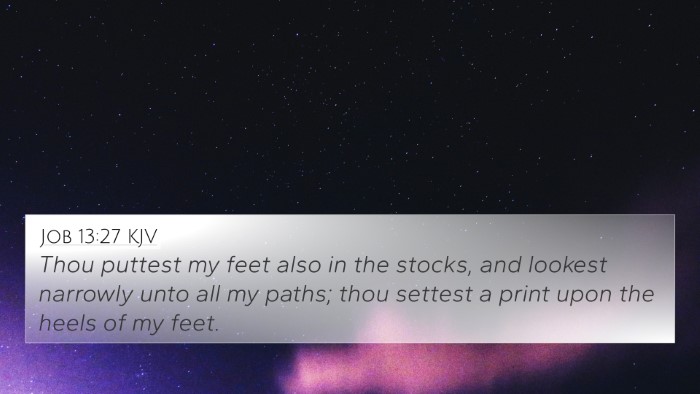
Job 13:27 (KJV) »
Thou puttest my feet also in the stocks, and lookest narrowly unto all my paths; thou settest a print upon the heels of my feet.
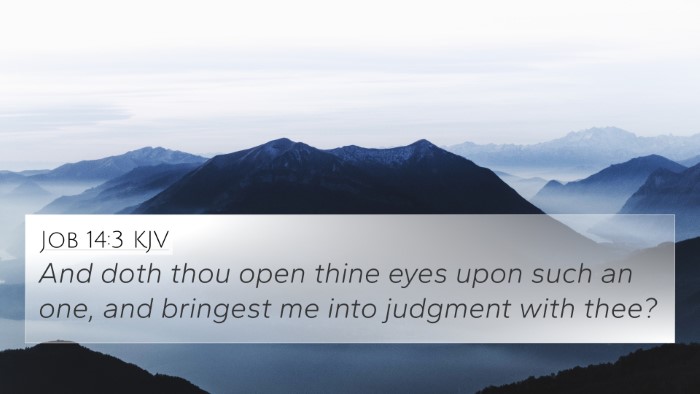
Job 14:3 (KJV) »
And doth thou open thine eyes upon such an one, and bringest me into judgment with thee?
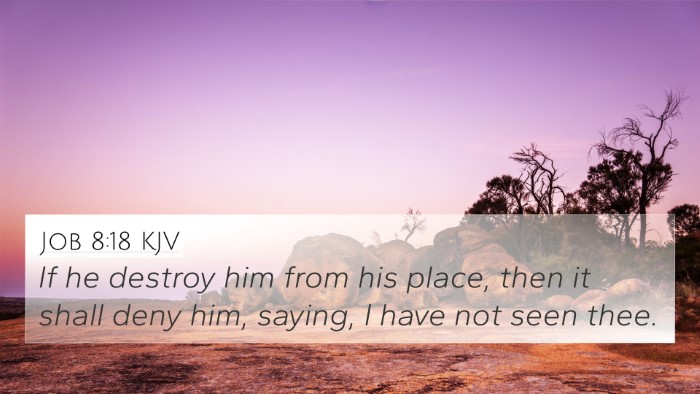
Job 8:18 (KJV) »
If he destroy him from his place, then it shall deny him, saying, I have not seen thee.

Psalms 39:11 (KJV) »
When thou with rebukes dost correct man for iniquity, thou makest his beauty to consume away like a moth: surely every man is vanity. Selah.
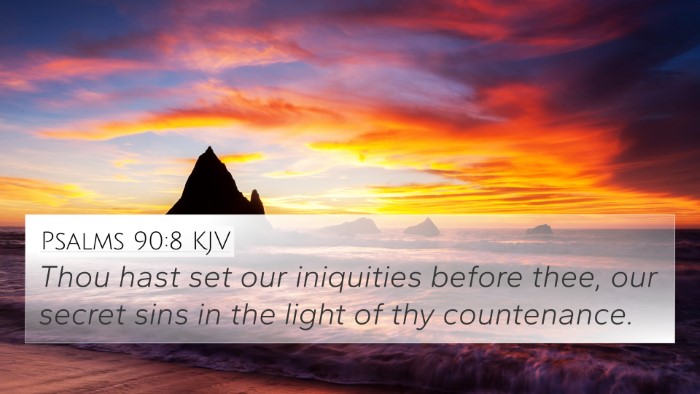
Psalms 90:8 (KJV) »
Thou hast set our iniquities before thee, our secret sins in the light of thy countenance.
Job 7:8 Verse Analysis and Similar Verses
Understanding Job 7:8
Job 7:8 states: "The eye of him who sees me will behold me no more; your eyes are upon me, and I am not." This verse reflects Job's profound existential crisis as he grapples with the nature of life, death, and divine observation.
Meaning and Insights
In this verse, Job expresses his sense of abandonment and insignificance in the face of divine scrutiny. The commentaries provide detailed interpretations:
- Matthew Henry: He emphasizes Job's feeling of vulnerability before God, highlighting that once he is gone, he will not be seen by God. Job perceives his life as fleeting, like a shadow that soon vanishes.
- Albert Barnes: Barnes argues that Job believes God's attention will shift away after his death, indicating a deep-seated fear of dying alone and unnoticed by the divine presence.
- Adam Clarke: Clarke suggests that Job’s statement reveals his understanding of the transient nature of life and the permanence of God's gaze upon him, furthering the theme of mortality and divine awareness.
Cross References
This verse connects with multiple Biblical texts, helping to enhance its meaning:
- Psalm 39:5: "Behold, you have made my days a few handbreadths, and my lifetime is as nothing before you. Surely all mankind stands as a mere breath!" - Parallels Job’s perspective on the brevity of life.
- Ecclesiastes 3:20: "All go to one place. All are from the dust, and to dust all return." - Reinforces the theme of mortality emphasized by Job.
- Hebrews 9:27: "And just as it is appointed for man to die once, and after that comes judgment," - Links the idea of a divine judgment after death, resonating with Job's fear of being forgotten.
- Job 10:9: "Remember that you have made me like clay; and will you return me to the dust?" - Job’s acknowledgment of human frailty and divine creation.
- Psalm 90:10: "The years of our life are seventy, or even by reason of strength eighty; yet their span is but toil and trouble; they are soon gone, and we fly away." - Echoes Job’s meditation on the fleeting nature of existence.
- Job 14:1-2: "Man who is born of a woman is few of days and full of trouble. He comes out like a flower and withers; he flees like a shadow and continues not." - Directly parallels Job's lament on life’s transience.
- Isaiah 40:6-8: "All flesh is grass, and all its beauty is like the flower of the field." - Supplements Job's recognition of human fragility.
- James 4:14: "What is your life? For you are a mist that appears for a little time and then vanishes." - Aligns closely with Job’s emphasis on the brevity of life.
- 1 Peter 1:24: "For 'All flesh is like grass and all its glory like the flower of grass. The grass withers, and the flower falls,'" - Stresses similar themes of impermanence found in Job's reflections.
- Job 23:3: "Oh, that I knew where I might find him, that I might go to his seat!" - Reflects Job’s deep desire for God’s presence and understanding amid his suffering.
Thematic Connections
Job 7:8 engages in a profound thematic conversation within the Biblical narrative:
- Mortality and Divine Observation: Job explores the tension between human fleetingness and God's eternal watchfulness.
- Existential Despair: The anguish expressed in Job 7:8 resonates with themes found in the Psalms, where the psalmists often vocalize their despair and loneliness in suffering.
- Divine Justice: Job’s assertion reflects a common theological inquiry throughout the scriptures regarding how divine justice interacts with human suffering.
Using Bible Cross-References
To fully grasp the nuances of Job 7:8, utilizing tools for Bible cross-referencing can enrich one's study.
- Bible Concordance: Helps locate pertinent verses that illustrate similar themes and discussions within the scripture.
- Bible Cross-Reference Guide: Useful in finding linked scriptures that resonate with Job’s experience of abandonment and the search for meaning.
- Cross-Reference Bible Study: Engaging in this method encourages deeper insights into the connections between varied Biblical texts.
- Bible Chain References: Following thematic chains can reveal often-overlooked relationships across the Bible.
Conclusion
Job 7:8 serves as a poignant reminder of the human experience—our desire to be seen and understood amidst our struggles. By utilizing comprehensive Bible cross-reference materials, one can uncover a robust understanding of this verse, linking it to a broader context within Scripture that speaks to the themes of life, death, and divine attention. Whether through comparative Bible verse analysis or thematic Bible verse connections, the exploration of Job's lament reveals rich insights in the journey of faith and understanding.
